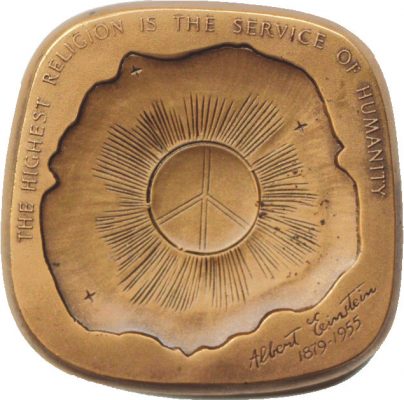 |  |
Albert Einstein medal designed by Robert Russin, struck by Medallic Art Company in quantities of 810 bronze, 290 pure silver, and about 8 gold-plated pure silver. 100 nickel-silver medals were imbedded in lucite for the Alumni Association of Einstein College. OBVERSE: Portrait, RUSSIN. Reverse: Peace symbol within the umbra of a solar eclipse, THE HIGHEST RELIGION IS THE SERVICE OF HUMANITY, Albert Einstein (signature) 1979-1955. 46 x 45mm.
Born in the German town of Ulm, Albert Einstein spent his early youth in Munich. While attending Zurich Polytechnic Institute he became a Swiss citizen. After graduating in 1890, he took a post at the Swiss Patent Office in Berne and carried out experiments on his own time. In his miracle year, 1905, he published four scientific papers. These papers helped found modern physics and changed views on space, time and matter. They are: Photoelectric effect (for which he won the Nobel Prize in 1921); Brownian motion; Special relativity; Matter-energy equivalence, e=mc2.
In a 1911 paper, Einstein predicted the amount that light would be deflected as it passed near the sun. The prediction was confirmed by Sir Arthur Eddington during the solar eclipse of May 29, 1919, which showed the amount of deflection to be exactly as predicted by Einstein. Before the experiment, Einstein remarked:”If relativity is proved right, the Germans will call me a German, the Swiss will call me a Swiss citizen, and the French will call me a great scientist. If relativity is proved wrong the French will call me a Swiss, the Swiss will call me a German, and the Germans will call me a Jew.”
Einstein’s interests were not confined to his research alone. His friend and collaborator Dr. Otto Nathan writes:
“Except for his devotion to science, no cause was more important or closer to his heart than the determination that the institution of war be forever abolished.”
Einstein advocated a United Europe in 1914; he welcomed the establishment of the League of Nations in 1919 and the United Nations in 1945. He was also deeply concerned with Jewish affairs and devoted his active interest to the creation of Brandeis University. Also, Einstein was convinced that the cultural survival of the Jews depended on the establishment of their own national homeland — Israel — with peaceful coexistence between Arabs and Jews necessary for success.
He also had a love of music and began playing the violin at an early age. He played with such groups as the Juilliard Quartet, and after settling in Princeton, enjoyed playing impromptu concerts, especially at children’s birthday parties.
After the death of Chaim Weizmann, when Einstein was asked if he would accept the presidency of Israel, the 73 year old scientist wrote: “I am deeply moved by the offer from our State of Israel, and at once saddened and ashamed that I cannot accept it. I am the more distressed … because my relationship to the Jewish people has become my strongest human bond, ever since I became aware of our precarious situation among the nations of the world.”